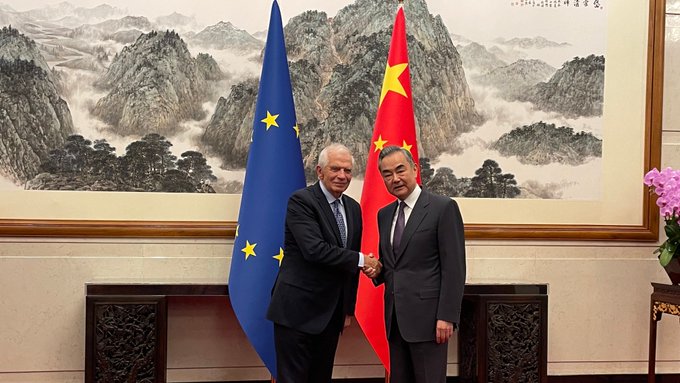On Saturday, Josep Borrell, the European Union’s top diplomat, said that during his visit to Beijing, he conveyed that Brussels takes China seriously and expects the same in return on geopolitical issues and trade. During his visit, Borrell had a comprehensive and friendly meeting with the country’s Foreign Minister Wang Yi, where they discussed EU-China trade tensions and a broad range of hot-button issues, including the Israel-Hamas conflict and China’s influence on Russia to stop its war in Ukraine.
The EU’s trade deficit with China, which reached $426 billion last year, has emerged as a significant sticking point in the relationship. As a result, Brussels has launched an investigation into whether to impose tariffs on Chinese electric vehicle (EV) imports, which it claims benefit from state subsidies. The Financial Times has reported that the EU plans to open an anti-subsidy investigation into Chinese steelmakers this month.
In Beijing last month, He Lifeng, vice premier of the People’s Republic of China, requested that EU Trade Commissioner Valdis Dombrovskis “exercise restraint in the use of trade remedy measures”. Beijing has also opposed the EU’s plans for a “carbon border adjustment mechanism,” which would impose 20% to 35% tariffs on high-carbon goods, such as steel and iron ore.
The EU and China plan to hold a summit by the end of the year, and Borrell’s visit, along with those of other top EU officials in recent months, has paved the way.
High Representative/Vice-President Borrell said, in a press conference, that he visited China to hold the EU-China Strategic Dialogue with his Chinese counterparts to prepare the next summit between the European Union and China that will take place before the end of the year.
During the past few weeks, there have been discussions between some European Commissioners and the Chinese Director and Foreign Minister Wang Yi. During the Strategic Dialogue, Borrell and his colleague focused on three issues.
Firstly, they emphasised the importance of bilateral relations between China and Europe. “[It was] important to [tell] to [my] Chinese counterpart, the Director and Foreign Minister Wang Yi, that for China and Europe cooperation is very much important, that Europe takes China very seriously and we also expect to be considered, not through the lens of our relations with others, but in ourselves,” said Borrell.
Since the war in Ukraine, Europe has become a significant geopolitical power and wants to engage with China on this basis, not just as an economic power. Establishing strong trade ties with China based on mutual respect and cooperation is a priority for the EU.
Borrell also emphasised that Russia poses a significant security threat to the EU.
“We are committed to supporting Ukraine facing the Russian invasion,” Borrell told his counterpart. He added that the EU is asking China to consider this very tough EU position.
Additionally, Borrell said they need to address the significant trade deficit between the European Union and China, as it has increased by 60% in recent years.
“And this should not be the consequence of just a competitive disadvantage between the European Union and China. It must be other structural reasons related to the market access encountered by European firms here in China”.
Despite the differences due to the different political and economic systems, Borrell said the EU believes there is still room for cooperation between the European Union and China. The two parts can work together to tackle the most pressing global challenges.
Borrell said climate change is one of the biggest challenges we face today. While China has made significant progress in adopting renewable energy, it still burns as much coal as the rest of the world combined. China’s increase in coal-fired electricity production is offsetting the reduction in the rest of the world. To combat climate change, the EU must partner with China and work collaboratively towards a sustainable future.

